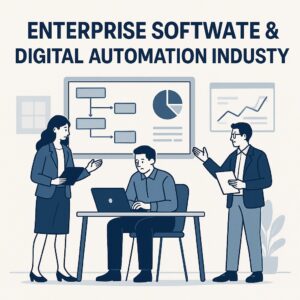Introduction
Happiest Minds Technologies and Mindtree are two significant players in the IT services sector, each with unique strengths and market strategies. Happiest Minds, founded in 2011, focuses heavily on digital transformation, cloud, security, and analytics. Mindtree, established in 1999, is a subsidiary of Larsen & Toubro and offers a broader range of IT services, including digital transformation but with a more extensive legacy system integration component.
Business Models
Happiest Minds Technologies: Happiest Minds operates with a digital-first approach, primarily focusing on digital transformation services. Their business model revolves around leveraging emerging technologies such as artificial intelligence, blockchain, cloud computing, and the Internet of Things (IoT). They emphasize agile development and a customer-centric approach, aiming to deliver innovative solutions rapidly.
Mindtree: Mindtree’s business model is more diverse, covering traditional IT services along with digital transformation. They provide end-to-end services, including application development, infrastructure management, and digital transformation services. Mindtree’s approach is characterized by deep industry expertise, a global delivery model, and strategic acquisitions to bolster its capabilities.
Market Segments
Happiest Minds Technologies: Happiest Minds targets industries such as EdTech, retail, BFSI (Banking, Financial Services, and Insurance), and healthcare. Their solutions are tailored to meet the digital transformation needs of these sectors, emphasizing agility and innovation.
Mindtree: Mindtree serves a broad spectrum of industries, including BFSI, retail, manufacturing, travel & hospitality, and healthcare. Their market segments are supported by strong domain expertise and a comprehensive suite of IT services, from digital transformation to legacy system modernization.
Future Strategies
Happiest Minds Technologies: Happiest Minds aims to continue its growth trajectory by deepening its expertise in next-gen technologies and expanding its global footprint. They focus on enhancing their service offerings in AI, IoT, and cloud solutions, aiming to capture a larger share of the digital transformation market.
Mindtree: Mindtree’s future strategy includes leveraging its parent company Larsen & Toubro’s resources to expand its service offerings and market reach. They plan to invest in automation, cloud, and AI to enhance their digital transformation capabilities. Additionally, Mindtree is focusing on strategic acquisitions to bolster its service portfolio and global presence.
Strengths
Happiest Minds Technologies:
- Digital Focus: Strong emphasis on digital transformation and next-gen technologies.
- Agility: Agile development practices and rapid delivery of innovative solutions.
- Customer-Centric: Deep commitment to customer satisfaction and tailored solutions.
Mindtree:
- Comprehensive Services: Wide range of IT services catering to various industries.
- Global Delivery Model: Robust global delivery network ensuring efficiency and scalability.
- Strong Parent Company: Backing of Larsen & Toubro provides financial stability and additional resources.
Weaknesses
Happiest Minds Technologies:
- Market Penetration: Smaller market presence compared to larger competitors.
- Resource Constraints: Limited resources and global reach relative to bigger players.
Mindtree:
- Complex Structure: Integration of diverse services can lead to operational complexity.
- Dependence on Parent Company: Heavy reliance on Larsen & Toubro for strategic direction and resources.
Financial Performance
Happiest Minds Technologies: As of the latest financial reports, Happiest Minds has shown impressive revenue growth, driven by its digital transformation services. The company reported a revenue of INR 1,260 crore (approximately USD 169 million) for the fiscal year 2023, with a healthy profit margin. Their financial health is underscored by a strong balance sheet and growing client base.
Mindtree: Mindtree, with its broader service portfolio, reported revenues of USD 1.4 billion for the fiscal year 2023. The company has consistently demonstrated strong financial performance, with significant contributions from its digital transformation and cloud services. Mindtree’s profitability is bolstered by its efficient global delivery model and strategic client relationships.
Market Capitalization
Happiest Minds Technologies: Happiest Minds, listed on the NSE and BSE, has a market capitalization of approximately INR 11,000 crore (around USD 1.5 billion). Their stock performance has been favorable, reflecting investor confidence in their digital-first business model and growth prospects.
Mindtree: Mindtree, also listed on the NSE and BSE, boasts a market capitalization of around INR 70,000 crore (approximately USD 9.4 billion). Their robust market position is attributed to consistent financial performance and strong industry reputation.
Recent Developments
Happiest Minds Technologies:
- Expansion: Recently expanded its presence in North America and Europe to tap into new markets.
- Acquisitions: Acquired Pimcore Global Services to enhance its digital commerce capabilities.
- Partnerships: Formed strategic partnerships with leading technology providers to strengthen its service offerings.
Mindtree:
- Integration: Continued integration with Larsen & Toubro to leverage synergies and enhance service delivery.
- New Contracts: Secured significant contracts in the BFSI and retail sectors, underscoring its market strength.
- Innovation: Invested in developing new AI and automation solutions to stay ahead in the digital transformation space.
Conclusion
Happiest Minds Technologies and Mindtree both have strong market positions, but they cater to different niches within the IT services sector. Happiest Minds’ digital-first approach and agility make it a formidable competitor in the digital transformation space. In contrast, Mindtree’s comprehensive service portfolio and robust financial backing provide it with a significant competitive edge.
Investors and stakeholders should consider these factors when evaluating these companies, keeping in mind their unique strengths, market strategies, and future growth prospects.




